As time marches on, we see fewer and fewer original prewar vehicles. Nearly all of the ones in good condition have been restored once or twice by now. In the infrequent event that a truly original vehicle in presentable condition appears in the marketplace, we all take notice. Take for example this 1938 Ford pickup for sale on eBay in Monroe, Louisiana. This truck has not spent its life cocooned away. It was a truck that was used and kept in factory condition. With bidding currently at $8,700 for this interesting original, what do you think it will sell for? In addition, should the purchaser restore it or just clean it up, get it running, and drive it as-is?
I once knew a fellow who was very active in the old Ford hobby. He knew every nut and bolt on an Early Ford V-8 like the back of his hand, as he had restored and/or repaired more than the average man could count. I believe he was an engineer by trade. Therefore, he was meticulous, highly intelligent, and had to have things the right way. His pet peeve, one that would bring this sweet and polite man to the point of rage, was wide whitewall tires on pickup trucks. If he laid eyes on a vehicle with a set of wide whites, he would rant and rave about how no self-respecting individual ever did such a thing back when these trucks were being used. Trucks were for work. He didn’t even like lower-end automobiles having them. Nobody could afford such niceties at that price level back then was his reasoning.
While he would not approve of the dingy wide whites on this truck, he would love to carefully look over this very original truck. By the looks of the wheels, it even has mechanical brakes. Ford was the last major manufacturer to produce vehicles with manual brakes. The rumor was that Henry Ford didn’t trust them. While cantankerous and set in his way, Ford was the boss. Converting mechanical brakes on pre-1939 Fords to hydraulic braking is not a difficult endeavor if you have access to the parts. Most working vehicles were converted to hydraulic, so seeing one in the wild on an unrestored vehicle is a bit rare. Of course, you would have to change out the wheels to later model five-lug Ford steelies.
Looking at the rest of the truck, there are very few places where the previous owners have altered it from the original. In the picture of the bed above we see that the original type boards with metal slats running from front to back have been replaced with what at first looks like a sheet of plywood. Looking closer you can see that they are separate boards. Perhaps these are tongue and groove, jointed boards. We can also see what looks to be an oil pressure and voltmeter attached to the dash. As for the sixties-style floor mat, I think I would keep it. It is so out of place on this truck that it looks cool.
A look under the hood reveals that the original style cloth wiring has been replaced with a hodge podge of various modern plastic wires. There are even plastic wiring sleeves in use as well. I don’t think the air cleaner housing is original to the truck either. A modern alternator rounds out the changes from the original. The seller does tell us that the person from whom the truck was purchased stored it in a garage for twenty years. The owner previous to that person said that the engine was running. That is a long time for an engine to sit immobile without negative consequences. At least everything is all there, and used Flatheads are fairly cheap thanks to folks in the hot rod community and their desire for more modern powerplants.
There are some other gripes about the condition. The driver’s front fender has a rip in it, the grill looks a bit beat up, the hood doesn’t seem to fit right, and it would be nice to see the truck cleaned up to identify other problems. From the pictures, we can determine that the Washington Blue paint looks acceptable enough to use as-is. Restoring this truck from the ground up would result in a very beautiful truck. Getting it safe to drive and reliable would be more than good enough in my book.
So, what would you do with it? Get it running and use it or restore it and show it? Let us know your thoughts in the comments.
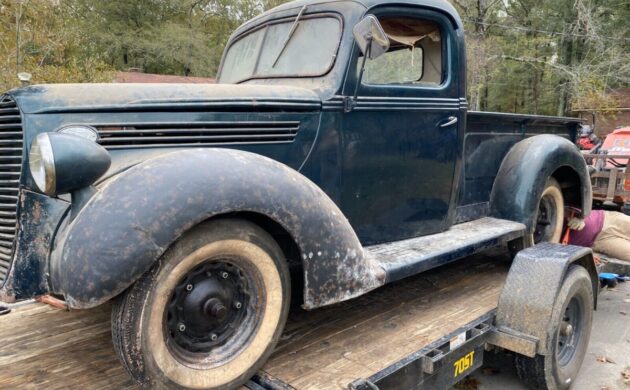
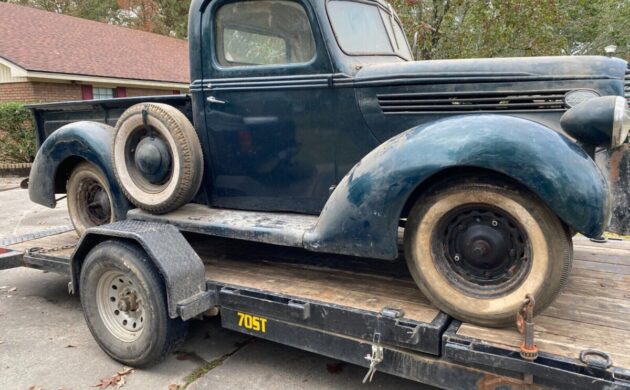
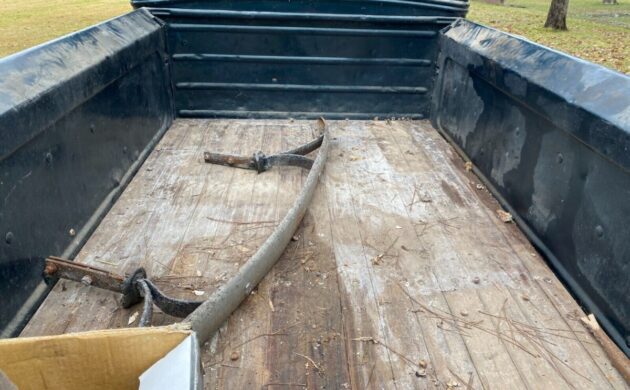
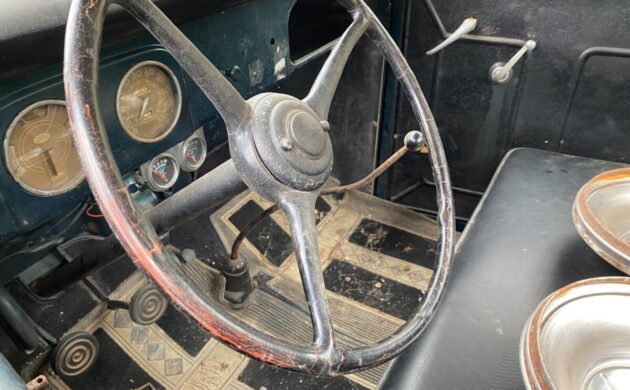
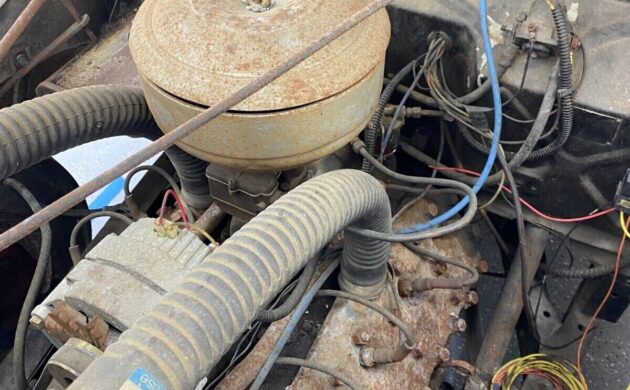





I say get it running and driving and enjoy it
Definitely a lot of possibilities for this truck. I would do a few upgrades for better driveability but pretty much leave it as is.
At least the price is fairly reasonable. I think someone could get a lot of enjoyment from this 38 Ford
Repair and run…when systems fail..upgrade where necessary to components and if possible service components within hands distance around the upgrade. Test!! And drive on!!
Never had a mechanical brakes vehicle or drove one.Like to try it.If I was living in country and had dirt roads I’d probably leave them especially because I like the original wheels.. I’d leave it alone and do all the usual stuff to make it safe and road worthy and get new blackwall radials.Nice truck.
Jeff, why not get it running and use it AND show it? The local car shows I attend don’t have any of these so I’m sure it will get attention where ever it goes. I’d probably leave it as it is mechanically and just drive it locally, until the mechanical brakes gave me a scare, then it’s on to juice land. If anyone keeps the flathead, change out those universal radiator hoses, they can crack the radiator inlets/outlets because the put constant pressure on them.
I’m right there with you all, just clean it up, get it road worthy and enjoy it for what it is. I bet that old pickup would be grinning from door to door.
Hold out for a ’40. Mechanical brakes aren’t good even when properly adjusted.
We had a friend of the family that used to rant and rave about stupid things, too. We’d visit him every once and a while, at the home. Oh, and this is a great truck. Get it running, wash it, and drive her.
An original 1938 Ford F-100 was recently donated to The California Auto Museum. It will be interesting to see what it sells for. This one will provide an idea.
To start there is no such thing as a 38 Ford F-100. First F-100 1953. As for this truck it is around 10 K now. I think that is very near the top of the market for this truck. It does appear to be in fairly good shape for a truck. I think you could possibly get it running and driving on a limited budget if what you don’t see doesn’t bite you (you know where).
Ford went to hydraulic brakes in 1939. 1939 was also the last year of the wide 5 wheel pattern, so using the wide 5 pattern wheels with hydraulics is pretty easy. I think you can use any of the 36 – 39 brake drums with 40 style backing plates and hardware. Non hydraulic brakes when properly adjusted work equally as well as same era hydraulics but require closer attention and more maintenance. Mechanical brakes may actually be safer than the single circuit hydraulics if kept in proper adjustment. Most people either aren’t capable or don’t want the bother of the maintenance.
427Turbojet, after doing some googling it may be just as expensive to convert cable to hydraulic brakes on this 38 Ford truck, as it would to do a front disc conversion and just use drums in the rear. That or enjoy it as is with cable brakes for awhile. I’ve never driven 30s era cable brake vehicle. Done a few drum to disc’s on 60s cars
Heck Dodson
I agree it’d be cheaper (and way better brakes) to convert to front discs and modern rear drums. Any conversation to hydraulics involves adding a master cylinder – hopefully a dual reservoir split circuit system and the associated lines, hoses and proportioning valve. The rub comes if you want to keep the wide pattern wheels. I have been wrestling with a similar question on updating the brakes on my 41 Chevy sedan. I want to keep the 6 hole wheels but the disc conversion kits only come in 5 hole wheel patterns, I could redrill the discs to 6 hole but the 15 inch artillery wheels (original on 39 – early 47 3/4 ton GM pickups) probably won’t clear the calipers. I could go with a disc kit and swap rear axles to get all 5 hole wheels (use 15 inch rally wheels and buy aftermarket 41 hubcaps adapted to fit rally wheels), but that involves eliminating the enclosed driveshaft and requiring a different transmission. I want to keep the column shift manual trans so I haven’t figured out how I’m going to do this yet. The factory brakes don’t go well on modern roads at modern speeds!
H Ford had some interesting ideas, but was not a well rounded man. Brilliant mechanically, though sociologically inept (to be polite) Hid biggest mistake was the way he treated Edsel.Not just personally (though that was horrendous) but professionally. Edsel could have steered that company to greatness far sooner if that egotistical mean old man would have quietly retired and let him take over. If he had done that, he and Lindberg could have moved to Berlin together and then all would have been well.
I had one like this loved that truck . Biggest problem is the double points spider distributer on front of motor. Takes a special talent to tune
I do not like flat head engines, so I would install a Y block, Ford three speed with overdrive trans and a 59 Ford 9 inch.Put a new suspension under the front, stock style, and have a nice truck. Now where is this truck?
Loving it and almost loving the price also. Working on a 38 Plymouth coupe with my brother and its coming along nice. I homestead on 5 acres in michigan, so this is a perfect fit when drivable. Fords parts are much more accessible than Plymouths due to prewar conditions, The flat head engine is a win win as far as restoration and modifications also. Really have me thinking on this one! Would love to know more and follow.
I’d update brakes to hydraulic and get the engine running again and drive it as is for a minute. If you really wanted to go nuts do the same quality restoration job the seller of the 37 Ford Deluxe Coupe here on BF did. Gotta love an early Ford V8 truck.
Tell me its not sold yet!
427Turbojet, yeah that would get complicated swapping the rear end, trans and encapsulated drive shaft. Almost better to just do front disc’s and keep rear drums as they are. Those are some quirky type drive shaft tubes. Most of the old school guys I knew who worked on them are long gone. Much less finding help with 30s cable to hydraulics.
Love the distinctive look of the
Ford ’38, the ’40 chevy and ’37-’40 Internationals. Really beautiful distinctive trucks. I agree, keep it stock except brakes.
Price keeps creeping up, shipping is also costly.
Una camioneta Ford de 1938 con una pátina única aparece en Barn Finds. El post describe el estado de la camioneta, que presenta óxido y desgaste que le dan un aspecto distintivo. En el post, se ofrece información sobre la historia de la camioneta y sus anteriores propietarios, así como sobre el atractivo de la pátina en el mundo de los coches clásicos.
For More Info:-https://caragencia.com/